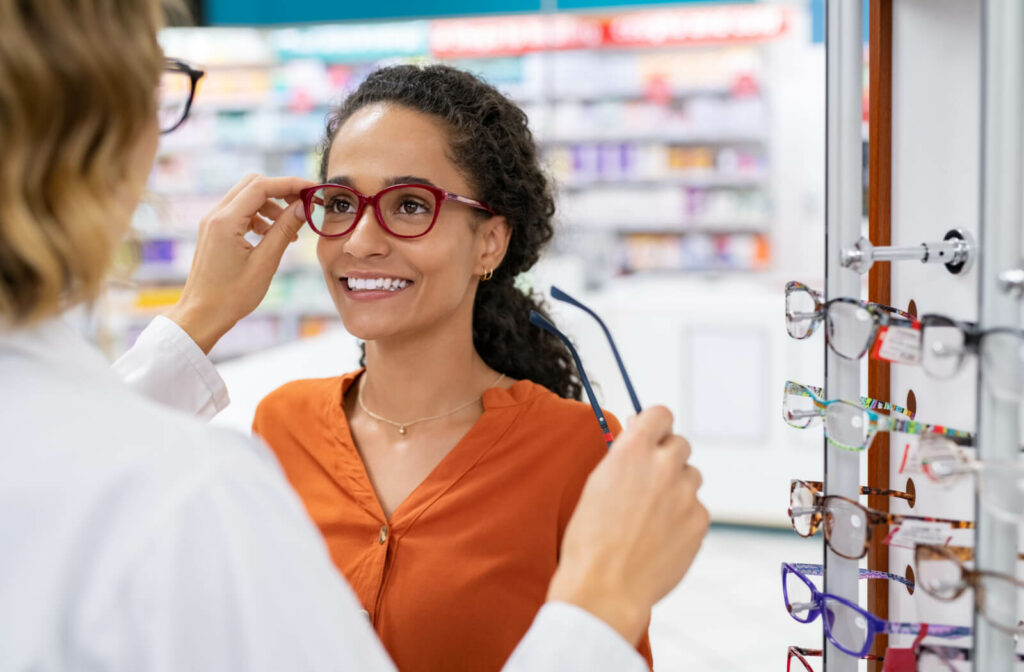Sunglasses serve two primary purposes: they protect your eyes from harmful UV rays that can contribute to eye diseases, and they can emphasize your personal style. But not all sunglasses are created equal.
Some of the essential features for sunglasses include:
- Full UVA and UVB protection
- Durable, quality lenses
- Frames that fit properly
- A style you love
Sunglasses can be a fashion statement, but they’re also essential for eye protection. Whether you need new everyday sunglasses or shades for sports and specialty activities, finding a pair with full protection and features you love is important.
Why Optometrists Recommend Wearing Sunglasses
Sun protection isn’t just for sunny days—it’s important to shield your eyes from UV rays no matter the weather. Don’t stop at thinking about sunglasses as a fashion statement. There are several essential reasons why optometrists recommend wearing sunglasses for UV protection.
UV Exposure-Related Eye Conditions
One of the most important reasons you should wear sunglasses is to protect your eyes from UV radiation. Long-term exposure to UV rays can contribute to a variety of eye conditions, including:
- Cataracts: the clouding of your eye’s natural lens, leading to blurred vision.
- Macular degeneration: damage to your macula, the part of the eye that controls central vision.
- Sunburned eyes (photokeratitis): sun damage to the eyes that can cause temporary but problematic defects in vision and other uncomfortable symptoms.
Reduced Skin Cancer Risk
Sunglasses protect not only your eyes but also the skin around your eyes from harmful UV radiation. Prolonged UV exposure can lead to eyelid skin cancer, and shielding your eyes and surrounding skin with sunglasses can help reduce the risk of developing these serious diseases.
Protection Against Wind, Dust, & Debris Exposure
Sunglasses help protect your eyes from wind, dust, and debris that can cause scratches, irritation, and corneal abrasions. These types of injuries can cause:
- Severe pain
- Redness
- Light sensitivity
- Blurry vision
- Watery eyes
- Discharge
- Foreign body sensation in the eye
These uncomfortable symptoms can prevent you from enjoying your day and disrupt your work or recreational activities.
Reduced Glare & Improved Visual Contrast
Sunglasses can also make your vision clearer and sharper when spending time in well-lit environments, such as at the beach or near tall glass buildings downtown on sunny days. Glare from reflective surfaces such as water, snow, or shiny objects can be blinding, causing eye strain and headaches. Polarized lenses can help reduce glare and improve overall visual contrast, which can help you see more clearly and comfortably.
Fashion & Style
Sunglasses can also express your unique fashion sense and add to your personal style. With the variety of sunglasses available, from classic and functional to fresh, chic designs, wearing them can add a finishing touch to any outfit.
Essential Features for Sunglasses
When shopping for sunglasses, there are some non-negotiable features you shouldn’t go without. Use the following list as your checklist when you’re shopping for your next pair of shades.
UV Protection
UV rays are a significant concern when it comes to sun exposure. Therefore, it’s essential to look for sunglasses that offer 100% UV protection. When buying sunglasses, check for a sticker or label that mentions the level of protection the lenses provide.
Avoid sunglasses that are labeled as “cosmetic” or do not provide any information regarding UV protection. If in doubt, we can help you choose sunglasses with full UVA and UVB protection.
Quality Lenses
Not all sunglass lenses are the same quality. Poor-quality lenses can distort your vision or even cause headaches. Look for sunglasses that have lenses made of quality materials designed for excellent optical clarity. Polarized lenses are also an option that can reduce glare and give you a clearer view.
Comfortable Fit
Sunglasses should fit comfortably on your face without causing excessive pressure and cover your eyes thoroughly to let minimal light pass through. When buying sunglasses, try various shapes and sizes to find the style that feels comfortable and fully shields your eyes.
Sunglasses that are too loose or too tight can cause discomfort or headaches over time. Look for sunglasses with adjustable nose pads, temples, and bridges so that you can fine-tune the fit. Feel free to check with your optical team too—we can discuss any fit concerns you may have.
Style
Sunglasses can be a key part of your wardrobe. They should complement your style and fit your fashion sense. You can choose from various shapes like aviators, wayfarers, round frames, or wraparounds, and with options that range from simple to bold or colorful, there are plenty of sunglasses to suit your style.
Choosing sunglasses that feel like an extension of your style helps encourage you to wear them—especially when they can complete your favorite outfits.

Get Sunglasses from the Experts
Sunglasses can protect your eyes and enhance your look. They are a crucial element of preventive eye care, helping you avoid long-term damage caused by UV radiation and other environmental factors.
Visit Los Angeles EyeCare Optometry Group to search our trendy and classic range of frames for something you love. With an eye exam, we can help you get prescription sunglasses, too. Contact us to book an appointment with our team today.



